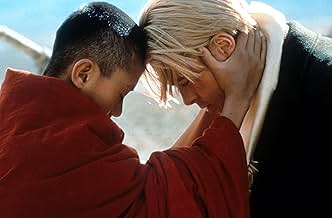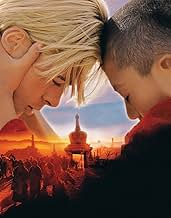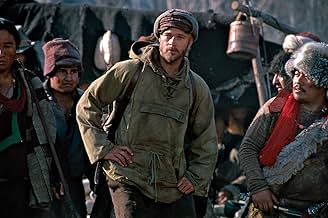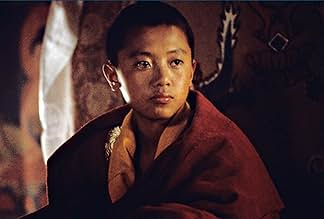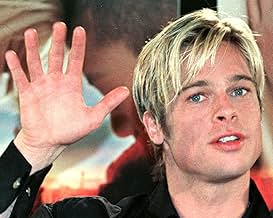La storia vera di Heinrich Harrer, uno scalatore di montagne austriaco che stringe amicizia con il Dalai Lama ai tempi dell'occupazione del Tibet da parte della Cina.La storia vera di Heinrich Harrer, uno scalatore di montagne austriaco che stringe amicizia con il Dalai Lama ai tempi dell'occupazione del Tibet da parte della Cina.La storia vera di Heinrich Harrer, uno scalatore di montagne austriaco che stringe amicizia con il Dalai Lama ai tempi dell'occupazione del Tibet da parte della Cina.
- Premi
- 3 vittorie e 8 candidature totali
BD Wong
- Ngawang Jigme
- (as B.D. Wong)
Ngawang Chojor
- Lord Chamberlain
- (as Ven. Ngawang Chojor)
Recensioni in evidenza
Tibet has certainly fascinated people all over the world. The hidden land in the most forbidding place on the planet not at either pole. In its day Lost Horrizon made quite a bit of money for its author James Hilton. But the real story of Heinrich Harrer is better than anything a fictional author could have thought up.
Brad Pitt is Harrer in Seven Years In Tibet and this has become my favorite film of his. Heinrich Harrer, a world famous mountain climber and Austrian national hero goes on an expedition in 1939 to conquer an unclimbed peak in the Himalayas. While he's doing his mountain climbing Germany of which Austria is now part of marches into Poland and World War II begins. Harrer and his party are interred as enemy aliens.
In 1942 Harrer escaped and he and a friend played by David Thewlis make their way into Tibet. The rest of the film is the seven years he spent there, centered around the unique friendship he formed with the child ruler of Tibet, the Dalai Lama. This in fact is the same Dalai Lama who today is possibly the world's greatest and non-aligned apostle of the gospel of peace.
Brad Pitt is never better in the film than he is with the three child actors who play the Dalai Lama at various stages of his life. The physical hardship that he and Thewlis endure just getting into Tibet is adventure enough. But the spiritual journey he undergoes in his time there makes this one of the most unique adventure stories of the last century.
One thing I liked about Seven Years in Tibet is that no effort was made to cover up Harrer's Nazi background. In an alternate universe one can speculate on what might have happened to him had he actually had to serve in the army in World War II. His internment saved him from possibly being involved any number of atrocities. God, fate, some kind of higher power saved him for something wonderful.
The cinematography is breathtaking, this film had an incredible number of locations. Note that it was shot in British Columbia, in Argentina with the Andes serving as the Himalayas, Austria and even some establishing footage was shot in Tibet itself on the sly.
Tibet's status is unique unto the world. It has been part of China since the Ming dynasty. It's referred to properly as the autonomous region of Tibet. China has given it autonomy in varying degrees over the past several centuries, it's never been truly independent. The Communist regime back in the days of Mao Tse-tung brutally asserted it's sovereignty a few times, most notably in late fifties when the Dalai Lama was forced to flee Tibet and live in Northern India where he resides to this day. That is when he's not traveling the world as it's foremost advocate of non-violence.
It is sad that this film did not get more box office than it did. Brad Pitt, David Thewlis, director Jean Jacques Arnaud are all persona non grata in the People's Republic of China for making this film. Quite a market indeed to be shut out of for a stand for humanity.
It's to be hoped that one day the Tibetans will be free. Until then they have their unique brand of Buddhism to sustain them and this wonderful film to tell their story.
Brad Pitt is Harrer in Seven Years In Tibet and this has become my favorite film of his. Heinrich Harrer, a world famous mountain climber and Austrian national hero goes on an expedition in 1939 to conquer an unclimbed peak in the Himalayas. While he's doing his mountain climbing Germany of which Austria is now part of marches into Poland and World War II begins. Harrer and his party are interred as enemy aliens.
In 1942 Harrer escaped and he and a friend played by David Thewlis make their way into Tibet. The rest of the film is the seven years he spent there, centered around the unique friendship he formed with the child ruler of Tibet, the Dalai Lama. This in fact is the same Dalai Lama who today is possibly the world's greatest and non-aligned apostle of the gospel of peace.
Brad Pitt is never better in the film than he is with the three child actors who play the Dalai Lama at various stages of his life. The physical hardship that he and Thewlis endure just getting into Tibet is adventure enough. But the spiritual journey he undergoes in his time there makes this one of the most unique adventure stories of the last century.
One thing I liked about Seven Years in Tibet is that no effort was made to cover up Harrer's Nazi background. In an alternate universe one can speculate on what might have happened to him had he actually had to serve in the army in World War II. His internment saved him from possibly being involved any number of atrocities. God, fate, some kind of higher power saved him for something wonderful.
The cinematography is breathtaking, this film had an incredible number of locations. Note that it was shot in British Columbia, in Argentina with the Andes serving as the Himalayas, Austria and even some establishing footage was shot in Tibet itself on the sly.
Tibet's status is unique unto the world. It has been part of China since the Ming dynasty. It's referred to properly as the autonomous region of Tibet. China has given it autonomy in varying degrees over the past several centuries, it's never been truly independent. The Communist regime back in the days of Mao Tse-tung brutally asserted it's sovereignty a few times, most notably in late fifties when the Dalai Lama was forced to flee Tibet and live in Northern India where he resides to this day. That is when he's not traveling the world as it's foremost advocate of non-violence.
It is sad that this film did not get more box office than it did. Brad Pitt, David Thewlis, director Jean Jacques Arnaud are all persona non grata in the People's Republic of China for making this film. Quite a market indeed to be shut out of for a stand for humanity.
It's to be hoped that one day the Tibetans will be free. Until then they have their unique brand of Buddhism to sustain them and this wonderful film to tell their story.
First of all, Seven Years In Tibet is a very aesthetically pleasing film. The snowy Himalayas, the Tibetan villages, and the amazing costumes and religious ceremonies are all filmed beautifully, with rich colours and lighting. The music by John Williams is also excellent, and it's fascinating to hear how it blends with the unusual Tibetan music.
It's not all surface though, there's depth here too. Don't believe the negative comments about Brad Pitt's acting. Admittedly his accent slips a bit in places, but he does a great job as Heinrich, both the unpleasant, arrogant character at the beginning, and the more gentle and wise man that he becomes as the film progresses. His relationship with the young Dalai Lama (a very impressive actor) is an unusual one and refreshingly unsentimental. The film is well edited; scenes are not drawn out any longer than they need to be. As a whole, it is fast paced but also peaceful, tender and moving. You don't get bored but you're not bombarded with pointless action scenes either.
It's a pleasant surprise to see a Hollywood film where women and other cultures aren't treated as objects, and are allowed to be full, complex characters. It could be argued that this film has a Western perspective, but after all, it is adapted from a book written by a European living in Tibet, and intended for Western audiences. It treats the Tibetan culture with a great deal of respect, so I don't really see a problem with that. Similarly, those who have complained that it doesn't tell you enough about the Dalai Lama and too much about Heinrich, ultimately it is Heinrich's story, and that is its strength: that it is one man's tale, and not a political polemic. It gives you a great sense of how people's stories intersect and how the whole world is connected.
Overall, an unusual film, very involving and emotional without sentimentality, with wonderful music and outstanding cinematography. Highly recommended.
It's not all surface though, there's depth here too. Don't believe the negative comments about Brad Pitt's acting. Admittedly his accent slips a bit in places, but he does a great job as Heinrich, both the unpleasant, arrogant character at the beginning, and the more gentle and wise man that he becomes as the film progresses. His relationship with the young Dalai Lama (a very impressive actor) is an unusual one and refreshingly unsentimental. The film is well edited; scenes are not drawn out any longer than they need to be. As a whole, it is fast paced but also peaceful, tender and moving. You don't get bored but you're not bombarded with pointless action scenes either.
It's a pleasant surprise to see a Hollywood film where women and other cultures aren't treated as objects, and are allowed to be full, complex characters. It could be argued that this film has a Western perspective, but after all, it is adapted from a book written by a European living in Tibet, and intended for Western audiences. It treats the Tibetan culture with a great deal of respect, so I don't really see a problem with that. Similarly, those who have complained that it doesn't tell you enough about the Dalai Lama and too much about Heinrich, ultimately it is Heinrich's story, and that is its strength: that it is one man's tale, and not a political polemic. It gives you a great sense of how people's stories intersect and how the whole world is connected.
Overall, an unusual film, very involving and emotional without sentimentality, with wonderful music and outstanding cinematography. Highly recommended.
This is a panoramic film exploring the wilderness of Tibet through the consciousness of an arrogant Austrian climber (Brat Pitt). As Pitt challenges Nanga Parbet, the ninth highest mountain in the world and one of the hardest to climb, the political chaos of late 1930's and 1940's, and his own demons, the nature of mankind is revealed as layers of civilization are peeled to reveal an inner self paradoxically more powerful and yet more vulnerable to the ebb and flow of inhumanity. His own philosophical journey is a reflection of political machinations of the time, the ontogeny recapitulating phylogenetic change of western civilization resulting in a complex modern world forever coiled for violence and warfare.
This film has a European pace unsuitable for those addicted to action figure movies with huge budgets and high body counts. I recommend it as a "good view" similar to a good read.
This film has a European pace unsuitable for those addicted to action figure movies with huge budgets and high body counts. I recommend it as a "good view" similar to a good read.
I missed this film the fist time around and saw it for the first time last night on DVD. I was pleasantly surprised. It seemed to me that some extraordinary effort went into creating an accurate portrayal of the forbidden city of Lhasa, and the lives and culture of the Tibetans who are at the core of the movie.
On the acting side, Brad Pitt was not quite totally believable as a German but, accent-quibbles aside, he did inhabit the character in a way that was compelling and interesting. I thought the supporting cast of Mako and (mostly) Tibetan unknowns was good and the use of these unknowns added credibility to the movie.
The scenery was as beautiful as you would expect it to be -- breathtaking shots of the Himalayas dominating throughout much of the movie.
On the acting side, Brad Pitt was not quite totally believable as a German but, accent-quibbles aside, he did inhabit the character in a way that was compelling and interesting. I thought the supporting cast of Mako and (mostly) Tibetan unknowns was good and the use of these unknowns added credibility to the movie.
The scenery was as beautiful as you would expect it to be -- breathtaking shots of the Himalayas dominating throughout much of the movie.
A movie is by definition a fictional tale. It may be based - more or less loosely - on real events, but it is still a fiction.
This part seems to have escaped many "reviewers" as it always does when a movie is based on "real events". In real life there are long periods when nothing exciting or interesting happens, but a movie cannot follow a character 24/7 in his daily life, even if that life takes place in Tibet.
This story is very loosely based on the experience of Austrian climber Heinrich Harrer, who embarked on a climbing expedition on the brink on WWII and ended up as POW in a British camp in India, for most of the war.
Having no reason to go back to Austria, he then ended up in Tibet where he met and became tutor to the 14th Dalai Lama. His adventure ended with the Chinese invasion of Tibet. That's it and it is already quite a lot.
The plot is a journey of discovery, not only geographical but also psychological. Thanks to his experience, Harrer turns from selfish, arrogant and uncaring into a gentler human being.
According to those who read Harrer account of his story, the film takes a lot of liberties, inventing episodes that - for me - are just supposed to make the story more cohesive. Also, I did not care much about Harrer involvement with the Nazi party, for which he apologised and that clearly was not the core of his existence.
Finally, for those who protest because the movie does not explore Tibetan culture, once more this is based on Harrer's tale, from is point of view. You want to know Tibetan history and Buddhist culture? There are thousand of non-fictional books and documentaries to fulfil this purpose.
This part seems to have escaped many "reviewers" as it always does when a movie is based on "real events". In real life there are long periods when nothing exciting or interesting happens, but a movie cannot follow a character 24/7 in his daily life, even if that life takes place in Tibet.
This story is very loosely based on the experience of Austrian climber Heinrich Harrer, who embarked on a climbing expedition on the brink on WWII and ended up as POW in a British camp in India, for most of the war.
Having no reason to go back to Austria, he then ended up in Tibet where he met and became tutor to the 14th Dalai Lama. His adventure ended with the Chinese invasion of Tibet. That's it and it is already quite a lot.
The plot is a journey of discovery, not only geographical but also psychological. Thanks to his experience, Harrer turns from selfish, arrogant and uncaring into a gentler human being.
According to those who read Harrer account of his story, the film takes a lot of liberties, inventing episodes that - for me - are just supposed to make the story more cohesive. Also, I did not care much about Harrer involvement with the Nazi party, for which he apologised and that clearly was not the core of his existence.
Finally, for those who protest because the movie does not explore Tibetan culture, once more this is based on Harrer's tale, from is point of view. You want to know Tibetan history and Buddhist culture? There are thousand of non-fictional books and documentaries to fulfil this purpose.
Lo sapevi?
- QuizJetsun Pema is the real-life sister of The Dalai Lama. In this film she plays the mother of The Dalai Lama and hence her own mother.
- BlooperThe movie depicts the Dalai Lama's coronation occurring after Germany surrenders in WWII and after China invades Tibet. The actual enthronement ceremony took place on 22 February 1940, (Iron-Dragon Year, 1st month, 14th day), long before the end of the war and the Chinese invasion. On 17 November 1950, the Dalai Lama assumed full temporal (political) power over Tibet which was more than 10 years after his enthronement ceremony.
- Citazioni
Dalai Lama: We have a saying in Tibet: If a problem can be solved there is no use worrying about it. If it can't be solved, worrying will do no good.
- Curiosità sui creditiAs the end credits roll, a view of the mountains of Tibet is seen.
- Colonne sonorePurification Et Benediction
Performed by Monks of Namgyal Monastere
I più visti
Accedi per valutare e creare un elenco di titoli salvati per ottenere consigli personalizzati
- How long is Seven Years in Tibet?Powered by Alexa
- Is 'Seven Years in Tibet' based on a book?
- Where/what is Nanga Parbat?
- When were Heinrich Harrer and the Dalai Lama born and when did they meet for the first time?
Dettagli
- Data di uscita
- Paese di origine
- Sito ufficiale
- Lingue
- Celebre anche come
- Siete Años en el Tíbet
- Luoghi delle riprese
- Aziende produttrici
- Vedi altri crediti dell’azienda su IMDbPro
Botteghino
- Budget
- 70.000.000 USD (previsto)
- Lordo Stati Uniti e Canada
- 37.957.682 USD
- Fine settimana di apertura Stati Uniti e Canada
- 10.020.378 USD
- 12 ott 1997
- Lordo in tutto il mondo
- 131.457.682 USD
- Tempo di esecuzione2 ore 16 minuti
- Colore
- Mix di suoni
- Proporzioni
- 2.39 : 1
Contribuisci a questa pagina
Suggerisci una modifica o aggiungi i contenuti mancanti

Divario superiore
What is the streaming release date of Sette anni in Tibet (1997) in Canada?
Rispondi


